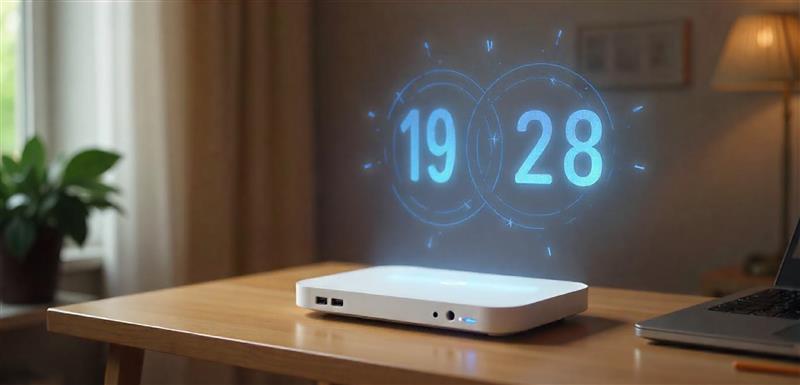Contents
- 1 What to look for in a smart home hub?
- 2 Amazon Echo (4th Gen)
- 3 Samsung SmartThings Hub
- 4 Aeotec Smart Home Hub
- 5 Hubitat Elevation Hub
- 6 Picking the Winners
- 7 TL;DR
Smart home technology is crucial to modern living spaces, and the smart home hub forms its core. It works as the command center as it connects your automation system. With it, you can control your environment, the lights, the security system, or the temperature. So, you need a system that meets your lifestyle and expectations, or it could break you. In this guide, we will cover the key factors to consider while purchasing a hub, the best options available in the market, and how they perform across different criteria, like compatibility and security. After reading this guide, you could choose a smart home hub that fits your home like a glove.
What to look for in a smart home hub?
The smart home hub is considered the central point or the brain of smart home systems. It connects different automation systems to provide a seamless integration experience. What should you look for while purchasing this product?
The best smart home hubs for home automation should be compatible with Z-wave, Zigbee, Bluetooth, and Wi-fi-enabled devices. They should support voice control and remote access protocols. They must have powerful security protocols to protect your data from vulnerabilities. Lastly, they should not have a steep learning curve while configuring or upgrading the model.
Amazon Echo (4th Gen)
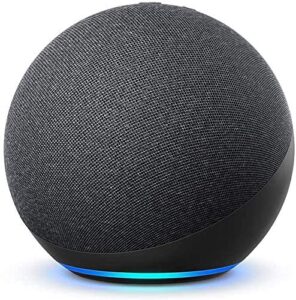
Perfect for Alexa users, this smart home hub is compact but powerful, supporting Zigbee, Amazon Sidewalk, and Bluetooth Low Energy.
The 4th Generation Amazon Echo has a new design, with the light ring now placed at the top. This subtle change does not make it less recognizable. The volume control buttons are on the top panel for better accessibility, and yes, it has Alexa.
Why you should buy it?
- Improved audio performance
- Built-in ports for audio
- Easy integration with smart home automation systems
Reasons to not buy it
- Absence of clock
- Although it is better, the audio is not comparable to Sonos One
- It is tough to talk to Alexa in a natural tone
This is a great choice if you want a smart speaker for your home. It has multiple radios and can connect with smart devices that operate on low power. This gives users control over their home automation systems. The Alexa Guard is a lifesaver in emergencies, as it will listen for sounds like breaking glasses and smoke alarms. It can automatically turn the lights and send notifications to your device if you are unavailable. It works with most smart home systems, a big plus for people putting together a smart hub system.
Samsung SmartThings Hub
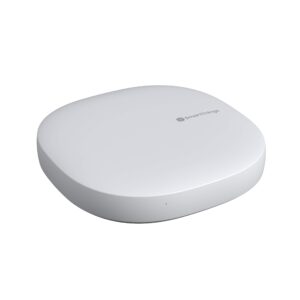
It is a great option for those looking for extensive device compatibility across brands.
If there’s one company that always knocks multi-usage out of the park, it’s Samsung. The Samsung SmartThing’s hub integrates well with Galaxy phones.
Pros
- The smart hub comes with a wireless charger
- It’s quite affordable and works well with smart home automation
- You can charge your Galaxy phone with it
Cons:
- SmartThings does not support Z-wave
- It may not work well with non-Samsung products
- You cannot charge Galaxy smartwatches
- It does not support fast charging for non-Galaxy gadgets
SmartThings works with Wi-Fi and offers flexibility to users (it’s not mandatory to plug it into the router). It has a nice feel and can fit into a corner very easily. With this smart hub technology for your home, you can trigger a “Good Night” or a “Good Morning” scene. Similarly, you can create a “Welcome Home” and a “Goodbye” scene.
How would you know the status? The LED indicator glows bright blue to identify its good health. If it shows yellow, you might have some problems. This is the best fit for a Samsung household.
Apple HomePod Mini
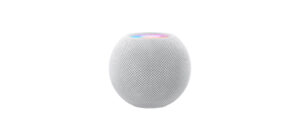
Ideal for Apple ecosystem users, offering seamless integration with HomeKit-compatible devices.
Benefits
- Gives solid performance in terms of audio, bass, and highs
- You can group speakers and use them as a pair of stereos
- Voice control (Siri)
- Can be integrated with the Apple Home app
- Comes in different colors
Disadvantages
- No aux input ports (Bluetooth)
- Does not support a lot of streaming music services
- Child control options are limited
- Siri still lags a bit
- Music streaming is a bit dicey
Apple’s HomePod Mini is a smart, budget-friendly, and compact choice. It’s 3.9 inches in diameter, 3.3 inches tall, and weighs around 0.76 pounds. You will not find a better smart home hub than this. Want to play music from your iPhone? Feed the music into the Homepod Mini and hear it blast off from the device. You can also try the hands-free feature to make calls and send messages.
Aeotec Smart Home Hub
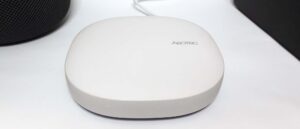
Aeotec is known for its flexibility and support for Z-Wave and Zigbee devices. It is ideal for a highly customized setup.
Features
- Supports Wi-fi, Bluetooth, Matter and Ethernet
- Works well with Alexa and Google Nest
- Best for complete automation
Cons
- Does not have a battery backup
- It does not work with HomeKit
- You cannot upgrade from the older versions
Aeotec is our clear favorite for smart home hubs for your modern home. You can connect with multiple devices, as it supports Zigbee and Z-Wave. It has a built-in SmartThings app to provide additional functionalities. If you want to enjoy Samsung’s SmartThings, you can try this gadget. The USB port is mainly there to diagnose issues rather than anything else.
Hubitat Elevation Hub
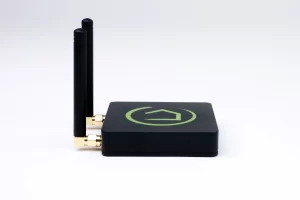
Appeals to tech enthusiasts, with local device control for enhanced privacy and faster response time. Hubitat Elevation Hub connects all smart home devices, such as lights, motion sensors, locks, and security cameras. If you want to upgrade from the SmartThings environment, then Hubitat is the way to go.
Pros
- It supports Zigbee and Z-wave
- Best for advanced customizations
- Provides local storage for Google Home automation and other systems
It might not be the best option because:
- It has a steep learning curve
- You need to plug the smart home hub into the router
Hubitat Elevation looks like a coaster, but it has some serious features. It supports Z-wae antennas but does not support Wi-fi. You can control it via the app, which is available on Google Play and Apple Stores.
Picking the Winners
Compatibility
Aeotec Smart Home Hub Vs. Apple HomePod Mini
Winner: Aeotec
Aeotec smart home hub works with almost all smart home gadgets. People can easily upgrade from SmartThings, as most of this setup is still produced by Samsung.
If you use diverse smart home solutions or are planning to expand, then this is the best option. Apple’s HomePod Mini, on the other hand, usually supports Apple-certified devices. However, the newer models support Matter and provide accessibility across different equipment. If you are a die-hard Apple fan, you may choose HomePod Mini.
Ease of Use
Aeotec Smart Home Hub Vs. Hubitat Elevation
Winner: Hubitat
Aeotec has a simple installation process, making it a good choice for first-time users. However, it supports advanced automation through its intuitive and interactive navigation panel. Hubitat, although a good smart home hub, does have a steeper learning curve. For a beginner, it can be tricky; to say the least. But if you want more control over automation, Hubitat is your tool.
Customization
Hubitat Elevation Vs. Aeotec
Winner: Hubitat
Hubitat won the “Best Home Assistant Automation” award for its local processing and advanced controls. It is best suited for complex scenarios and gives control over the environment. Aeotech’s fine-tuning feature is simple and might not appeal to veteran smart home automation system owners.
Security
Hubitat Elevation Vs.Apple HomePod Mini
Winner: Apple
Apple’s top priority is maintaining security and privacy, and it does that through strong encryption and data-sharing protocols. Hubitat is a close second, as it also has advanced encryption protocols.
Connectivity
Aeotec vs Amazon Echo
Winner: Aeotec
Aeotec and Amazon Echo both support Zigbee protocols, but Echo does not support Z-wave support. Amazon Echo works best for short distances, but you should choose Aeotec for larger households.
Performance
Hubitat vs Apple HomePod Mini
Winner: Hubitat
Hubitat experiences minimal latency, which means it can work even during low connectivity. HomePod relies on cloud connectivity to offer you a smooth experience. You may not face any issues with simpler automation, but it might lag during complex operations.
Cost
Amazon Echo Vs. Hubitat
Winner: Echo
Echo 4th Gen is an affordable smart home hub with most features available in the free model. You can enjoy some advanced features by paying the premium, but it is the best budget-friendly model. Hubitat has a high model price, but it does have additional fees.
Energy Efficiency
Hubitat vs Echo
Winner: Hubitat
Hubitat excels in this department compared to Amazon Echo. However, you should note that Echo doubles as a smart speaker and offers moderate energy efficiency.
Looks and Aesthetics
Amazon Echo vs Apple HomePod Mini
Winner: Both
Amazon Echo is a stunning addition to your home decor for its stylish and functional look. It comes in different colors, styles, and models, giving you more options. Apple HomePod is also a good choice for Apple lovers.
TL;DR
Aeotec becomes a winner across different categories, closely followed by Hubitat, Echo, and Apple.
The best smart home hub would meet your requirements, budget, and existing environment. Upon evaluating the best smart home hubs for home automation across different parameters, Aeotec is our pick. It performed well and is the most compatible option on our list. It supports Z-wave, Zigbee, Matter, Wifi, and Bluetooth and is quite user-friendly. Amazon Echo and Apple HomePod Mini are also strong contenders but have some compatibility constraints. Hubitat does offer advanced options, but experienced users love it.

